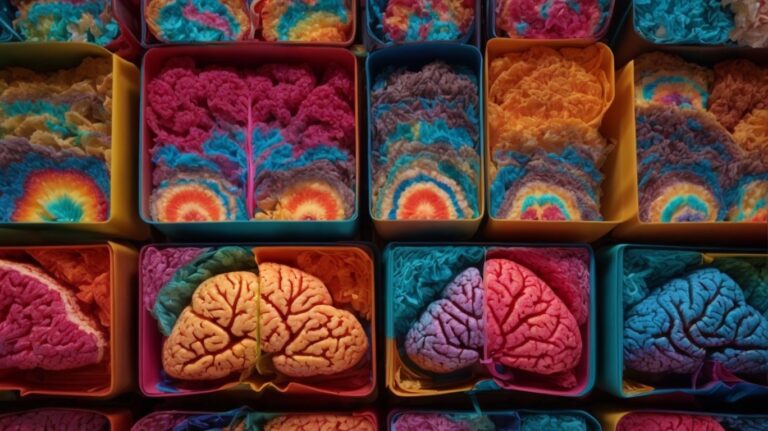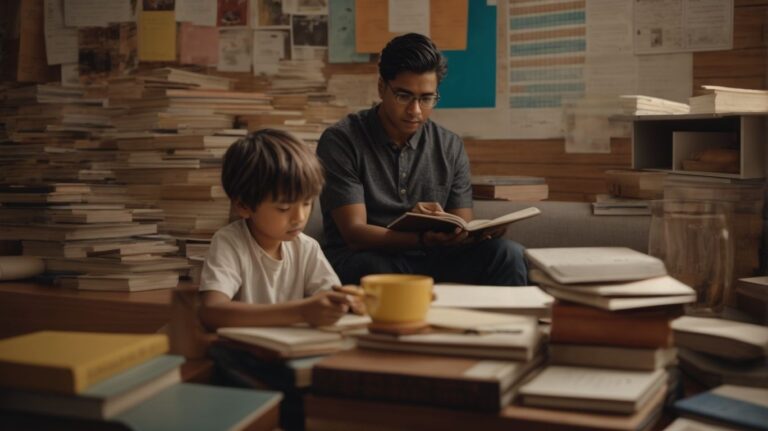Developmental psychology explores how individuals grow and change over time, focusing on various stages of development. One key concept within this field is conservation, which refers to the understanding that certain properties of objects remain the same despite changes in appearance.
In this article, we will delve into the main theories of developmental psychology, the stages of conservation development, factors influencing conservation in children, practical applications in education, teaching strategies, and criticisms of conservation in this fascinating area of study. Let’s explore the world of conservation in developmental psychology together.
Contents
- 1 What Is Developmental Psychology?
- 2 What Is Conservation?
- 3 What Are The Stages Of Conservation Development?
- 4 How Does Conservation Develop In Children?
- 5 What Are The Practical Applications Of Conservation In Developmental Psychology?
- 6 What Are The Criticisms Of Conservation In Developmental Psychology?
- 7 Frequently Asked Questions
- 7.1 What is conservation in developmental psychology?
- 7.2 At what age do children typically develop conservation skills?
- 7.3 How does conservation relate to other aspects of cognitive development?
- 7.4 Are there cultural and societal factors that can affect the development of conservation skills?
- 7.5 How can parents and educators promote the development of conservation skills in children?
- 7.6 What are some implications of understanding conservation in developmental psychology?
What Is Developmental Psychology?
Developmental psychology is the scientific study of how children develop, focusing on their cognitive abilities, understanding, and progression through different stages of growth.
Understanding developmental psychology plays a key role in comprehending the intricate process of how children’s cognitive functions evolve over time. Researchers and psychologists delve into various stage theories, such as Piaget’s, which highlight the different cognitive stages children go through, from sensorimotor to concrete operational stages. By studying these stages, experts can gain deeper insights into how children perceive and interact with the world around them. Factors like genetics, environment, and social interactions heavily influence a child’s cognitive development, emphasizing the dynamic nature of this field.
What Are The Main Theories In Developmental Psychology?
Key theories in developmental psychology, such as Piaget’s theory of cognitive development, provide insights into how children master tasks and understand the world around them.
According to Piaget’s stages of cognitive development, children progress through distinct stages, each characterized by unique ways of thinking and understanding. At the sensorimotor stage, infants learn through sensory experiences and motor actions, gradually developing object permanence and basic understanding of cause and effect.
As children advance to the preoperational stage, their thinking becomes more symbolic, enabling language development and imaginative play. They struggle with conservation tasks and exhibit egocentrism, perceiving the world solely from their perspective.
In the concrete operational stage, children demonstrate enhanced abilities in logical thinking and problem-solving. They grasp concepts like conservation and reversibility, allowing them to understand multiple aspects of a situation simultaneously.
What Is Conservation?
Conservation refers to the understanding that certain properties of objects, such as mass, volume, and number, remain the same even when their physical appearance or arrangement changes.
When children begin to comprehend the concept of conservation, it marks a crucial stage in their cognitive development. It enables them to grasp that even if a liquid is poured from a tall, thin glass into a short, wide one, the amount remains constant. Similarly, they realize that rolling out a piece of dough into a thin strip doesn’t alter the total quantity of dough. This understanding of object properties being conserved despite transformations indicates a milestone in their mental growth and reasoning abilities.
What Are The Key Concepts In Conservation?
The key concepts in conservation revolve around the preservation of attributes like length, liquid quantity, mass, volume, and number, despite changes in appearance or arrangement of objects.
Conservation is a fundamental principle in various areas of science, from physics to chemistry and biology.
- When we discuss length in conservation, we refer to the idea that an object’s physical distance remains constant under different conditions.
- Similarly, the conservation of liquid volume dictates that the amount of liquid in a closed container stays the same, regardless of shape changes.
- Mass conservation focuses on the notion that the total mass of a closed system remains unchanged during physical or chemical transformations.
- Furthermore, volume conservation plays a crucial role in understanding how the amount of space occupied by an object remains constant.
- The principle of number conservation asserts that the quantity of items remains fixed despite changes in their arrangement.
What Are The Stages Of Conservation Development?
Conservation development progresses through stages, starting with concrete operational thinking, as proposed by Piaget, where children exhibit logical reasoning about conservation tasks.
In this phase of cognitive development, children typically demonstrate their ability to understand that certain properties of objects remain constant even when the appearance changes. This is evident in tasks like conservation of volume or quantity, where a child can realize that pouring water from a short, wide glass into a tall, narrow glass does not change the amount of water.
As children progress to the operational stage, their reasoning becomes more sophisticated. They start to grasp the concept of reversibility and understand that transformations can be undone. For instance, a child can comprehend that spreading out a set of counters does not change the total number of counters, highlighting their enhanced reasoning abilities.
Sensorimotor Stage (Birth – 2 Years)
During the sensorimotor stage, from birth to 2 years, children explore the world through their senses, gradually developing an understanding of objects and their properties.
At this stage, a child’s primary way of learning is through direct sensory experiences and physical interactions with the immediate environment. They engage in activities like shaking a rattle to understand sound, mouthing objects for taste and texture, and grasping items to examine their shape and weight.
As they progress through this stage, children start to demonstrate basic problem-solving skills by using trial and error to achieve goals, such as figuring out how to reach a toy placed slightly out of reach.
Preoperational Stage (2 – 7 Years)
In the preoperational stage, spanning from 2 to 7 years, children begin to develop conservation skills but may still struggle with logical reasoning and understanding Piaget’s conservation tasks.
During this stage, children show progress in conservation tasks, such as understanding that the quantity of a substance remains the same even when its appearance changes. Their reasoning abilities are marked by egocentrism, where they struggle to understand that others may have different perspectives than their own.
Piaget’s conservation concept of understanding that certain properties are conserved despite changes in appearance can be particularly challenging for children in this stage. They often focus more on the outward appearance rather than the underlying principles, leading to difficulties in grasping conservation tasks.
Concrete Operational Stage (7 – 12 Years)
The concrete operational stage, from 7 to 12 years, marks significant progress in children’s conservation understanding, as they gain better reasoning skills and master conservation tasks.
During this stage, children become more adept at grasping the concept of conservation, which refers to the idea that certain properties of objects remain the same despite changes in their appearance or arrangement. This newfound ability allows them to understand that, for example, pouring liquid from a short, wide glass into a tall, narrow glass does not change the amount of liquid present.
Along with their improved conservation understanding, children in the concrete operational stage also exhibit enhanced reasoning abilities. They can now think logically about concrete events and engage in mental operations, such as addition, subtraction, and classification.
Mastering conservation tasks during this developmental phase plays a crucial role in shaping children’s cognitive abilities and preparing them for more complex problem-solving tasks in the future. By honing their understanding of conservation, children build a foundation for higher-level cognitive processes and critical thinking skills.
Formal Operational Stage (12+ Years)
In the formal operational stage, starting at 12 years, children exhibit advanced cognitive abilities, allowing them to excel in conservation tasks and complex reasoning.
This developmental phase marked by the formal operational stage represents a crucial milestone in a child’s cognitive journey. At this point, their expanding mental capabilities enable them to engage in abstract thinking and hypothetical reasoning with remarkable proficiency.
Tasks involving conservation, such as understanding that the quantity of a substance remains the same even if its appearance changes, become well within their grasp. This newfound cognitive prowess enables children to not only solve complex problems but also to contemplate various possibilities, anticipate consequences, and think critically about multiple perspectives.
How Does Conservation Develop In Children?
Conservation develops in children through a progression of reasoning and understanding, where they gradually master tasks that involve preserving properties of objects despite transformations.
During the initial stages of development, children may struggle with the concept of conservation, often focusing on the immediate appearance of objects rather than the underlying properties. As they progress, their reasoning evolves, allowing them to comprehend that the quantity or volume of an object remains constant even if its appearance changes. Through interactive activities and hands-on experiences, children build a deeper understanding of conservation principles, such as reversibility and identity. This cognitive growth marks a crucial milestone in their intellectual development, paving the way for more complex problem-solving skills in the future.
What Are The Factors That Influence Conservation Development?
Various factors, including cognitive abilities, age, and exposure to conservation tasks, influence the development of conservation skills in children, impacting their reasoning capabilities.
Research suggests that children’s cognitive abilities play a crucial role in their understanding of conservation concepts. As they grow older, their ability to grasp these ideas becomes more sophisticated due to the maturation of their cognitive processes.
Experience with conservation tasks directly contributes to their skill development, as repeated exposure allows for practice and reinforcement of their reasoning abilities. The age at which children are introduced to these tasks can also shape their progression, with younger children typically requiring more guidance and support in their conservation reasoning compared to older counterparts.
What Are The Practical Applications Of Conservation In Developmental Psychology?
The practical applications of conservation in developmental psychology extend to enhancing learning and education by utilizing conservation tasks to improve children’s reasoning abilities and cognitive development.
Conservation tasks, such as the classic conservation of liquid or number tasks, are commonly used to assess domain-specific cognitive skills in children. Through these tasks, educators and psychologists can observe how children understand the concept of conservation.
Incorporating conservation tasks in educational settings can help children develop critical thinking skills and logical reasoning. By engaging in activities that require conservation thinking, children are challenged to consider different perspectives, leading to enhanced problem-solving abilities.
How Can Conservation Be Used To Improve Learning And Education?
Using conservation tasks in learning and education settings can bolster children’s cognitive development by challenging their reasoning skills and fostering a deeper understanding of object properties.
Integrating conservation tasks into the educational curriculum serves as a hands-on approach to enhancing learning outcomes, as it encourages active participation and critical thinking among students. Through these tasks, children engage in practical applications of concepts, which not only solidify their understanding but also stimulate their curiosity and creativity.
These tasks provide a platform for children to collaborate, communicate, and problem-solve collectively, enriching their education experience by promoting social skills and teamwork. The interactive nature of conservation tasks also cultivates a sense of responsibility towards the environment, instilling valuable lessons about sustainability and conservation.
What Are The Strategies For Teaching Conservation To Children?
Effective strategies for teaching conservation to children involve hands-on tasks, visual demonstrations, and interactive activities that facilitate their understanding and development in grasping conservation concepts.
Hands-on tasks such as creating recycled art projects or planting trees allow children to experience conservation practices firsthand, making the concepts more tangible.
- Incorporating visual aids like educational videos or illustrations aids in reinforcing the importance of conservation in a visually engaging manner.
- Interactive approaches, such as group discussions or simulations, foster children’s critical thinking skills and encourage active participation in learning about environmental preservation.
What Are The Criticisms Of Conservation In Developmental Psychology?
Critics in developmental psychology have raised concerns about the limitations of conservation tasks in fully capturing children’s understanding and cognitive abilities, pointing out potential flaws in the assessment of conservation skills.
Some critics argue that conservation tasks may not be a holistic measure of a child’s cognitive development as they primarily focus on specific aspects of knowledge.
These skeptics suggest that the tasks might not adequately reflect the underlying thought processes and mental capacities that contribute to a child’s understanding of conservation.
Critics highlight that children’s performance on these tasks could be influenced by factors such as motivation, attention span, and cultural background, which may skew the assessment results.
Frequently Asked Questions
What is conservation in developmental psychology?
Conservation in developmental psychology refers to the understanding that certain physical characteristics of objects, such as size, shape, and quantity, can remain the same even when their appearance is altered. It is an important aspect of cognitive development in children and is often assessed through tasks that involve conservation, such as the conservation of liquid task.
At what age do children typically develop conservation skills?
The development of conservation skills varies from child to child, but it typically begins to emerge around the age of 6 or 7. By the age of 8 or 9, most children have fully developed conservation skills.
How does conservation relate to other aspects of cognitive development?
Conservation is closely linked to other cognitive abilities, such as classification, seriation, and reversibility. These skills all involve the ability to understand and manipulate abstract concepts, which is a key aspect of cognitive development.
Are there cultural and societal factors that can affect the development of conservation skills?
Yes, cultural and societal factors can play a role in the development of conservation skills. For example, educational opportunities and experiences, as well as cultural beliefs and values, can influence a child’s understanding of conservation.
How can parents and educators promote the development of conservation skills in children?
One effective way to promote the development of conservation skills is through hands-on activities and tasks that involve concrete objects. Encouraging children to explain their reasoning and providing opportunities for them to practice conservation tasks can also aid in their understanding.
What are some implications of understanding conservation in developmental psychology?
Understanding conservation in developmental psychology can help educators and parents identify potential areas for cognitive growth and development in children. It can also aid in the assessment of cognitive abilities and inform educational practices and interventions for children who may be struggling with conservation skills.



